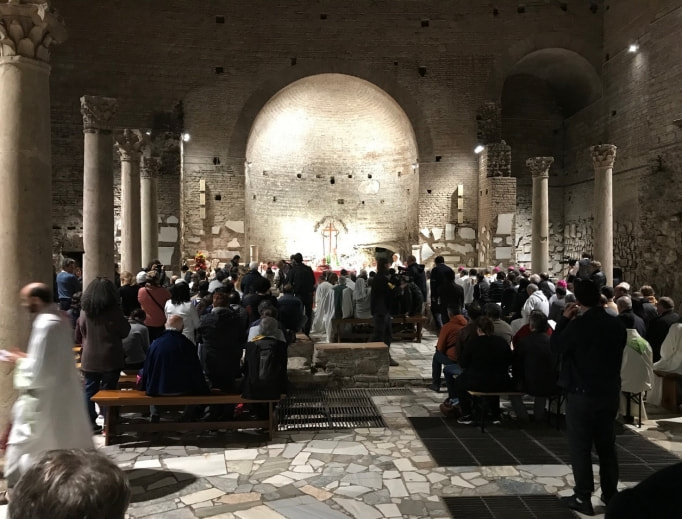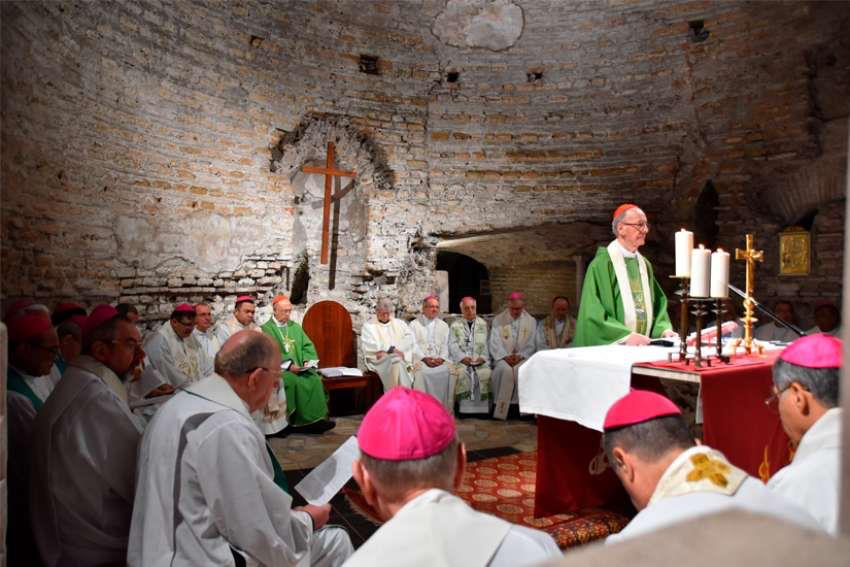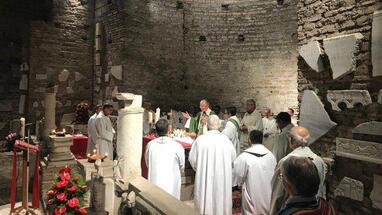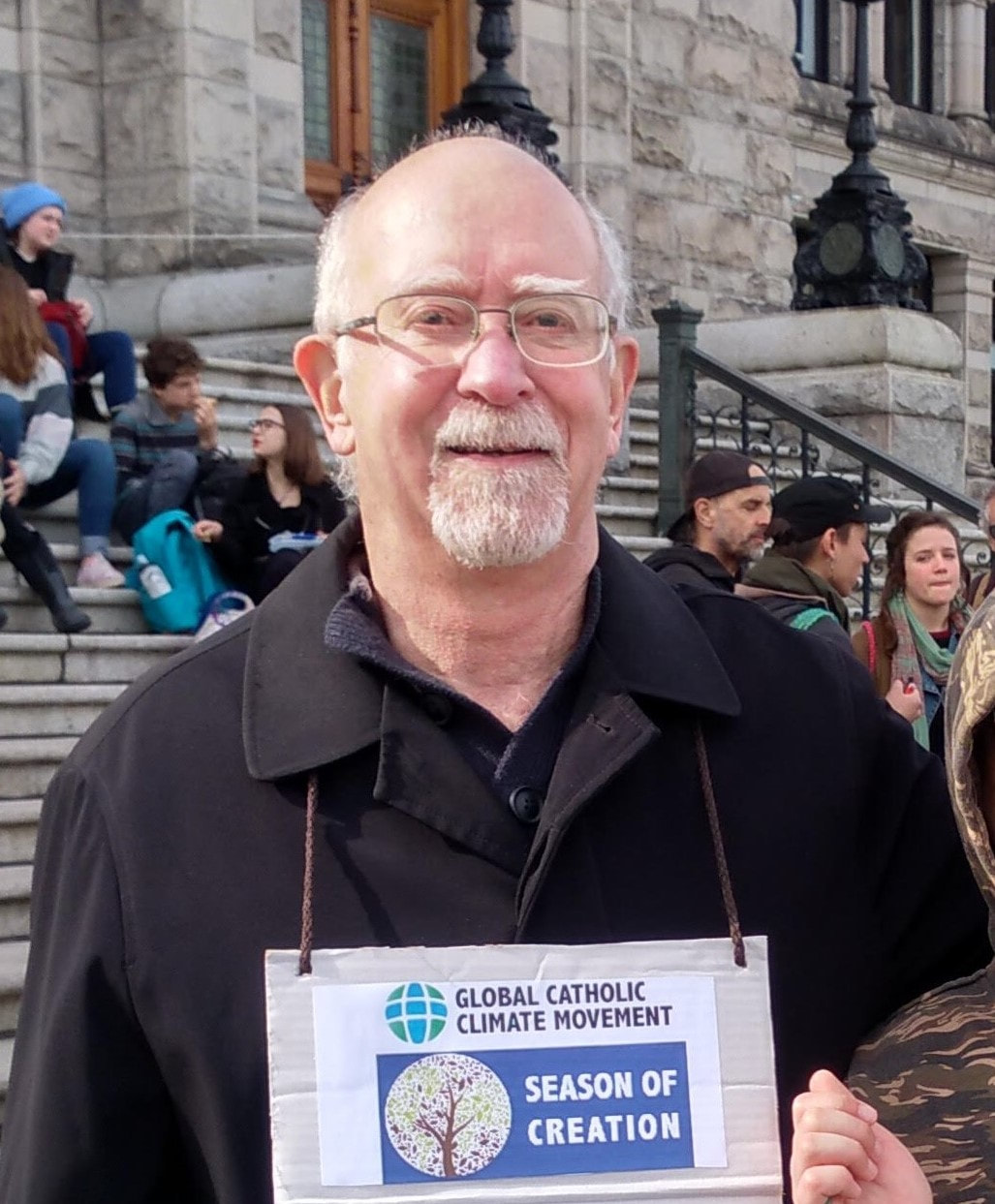As an example let me quote Prof Roberto de Mattei, a historian with a mixed past reputation who has been described as "a renowned apologist for ultra-traditional Catholicism" (and loud confirmed critic of Pope Francis): “The Amazon Synod is therefore the symbolic fulfillment of the Second Vatican Council, the realization of that “preferential option for the poor” for which Monsignor Helder Câmara, Don Giuseppe Dossetti, Cardinal Suenens and Cardinal Lercaro fought so hard for. The Amazonian Party …, by lining up its troops in the Catacombs of Domitilla, is sending the Church this message: “There is no going back.”. “And [it’s] only the beginning, for another 50 years” as Maurício López, Executive Secretary of REPAM, stated, during the signing of the new Pact of the Catacombs.”
What? Not Vatican II! And Pact of the Catacombs! Oh no, woe unto us! (Pardon my sarcasm). You may recall that “preferential option for the poor” is actually a principle of Catholic Social Doctrine! Do such critics not reveal themselves by their own words, or merely the complexity of life as a Catholic? Some of what de Mattei abhors and castigates, I admire and promote. Such criticism (in Rorate Cæli, 21 Oct 2019) totally misses the mark and is lost on me.
In another example of Catholic ultra-right wing criticism of Pope Francis, the title says it all: “From the Pact of the Catacombs to the Amazon Synod The pope’s heretical assault on Catholicism was a long time coming.” by George Neumayr, 20 Oct 2019
“Dom Hélder Câmara, a Brazilian archbishop who served as the head of the archdiocese of Olinda and Recife from 1964–85, was famous for his let-it-all-hang-out socialism and support for priests who joined armed revolutions. “My socialism is special, it’s a socialism that respects the human person and goes back to the Gospels. My socialism it is justice,” he said. “I respect priests with rifles on their shoulders; I never said that to use weapons against an oppressor is immoral or anti-Christian.” ”
My comment is that we know that many repressive regimes’ armies had Catholic military chaplains. I will just say one man’s terrorist is another man’s freedom fighter.
Criticism of the Synod came from many sides.
Not all were satisfied with the emphasis on the cry of the earth. Some thought it was not enough and some that it was too much. What is certain is that for many of the Amazonian people, while priests, deacons and role of women are important they must not overshadow the overriding importance of the earth and human rights. “While media focus on married priests and women deacons, "for us, that is a distraction, because the bottom line is life," says a Curripaco leader from Venezuela, "This synod for us is about the planet." Read more
Many of them are willing to risk and lose their lives. Yet another loss has recently been reported: “Brazilian 'forest guardian' killed by illegal loggers in ambush. Paulo Paulino Guajajara was killed by armed loggers …”
Paulo Paulino Guajajara is not the first. According to Global Witness, Brazil is the deadliest country in the world for environmental and land defenders with 44 killings recorded in 2017. Maranhão – the nation’s poorest state – is among the worst affected. There were more death threats and attacks on indigenous groups here than anywhere else in 2016, according to the Pastoral Land Commission.
A balanced voice of reason from a Franciscan Sister
(whom I met and worked with at the World Social Forum in 2016 in Montreal)
“Franciscan Sister Sheila Kinsey, executive pro-secretary of the justice, peace and integrity of creation commission of the Union of Superior Generals (USG) and International Union of Superior Generals (UISG), told the Register that, for her, the priority for the Amazon was ensuring that indigenous people have the benefits of their resources, especially in mining communities.
On criticism that the synod has, for some, seemed to be more about politics and social justice than worship, faith and salvation of souls, Sister Sheila said it is important, “through faith, to find ways to work together.” This is how those against the faith “destroy: They politicize issues that are really of our faith, and we get caught up in that,” said Sister Sheila, who is not taking part in the synod. “That’s how they co-opt our message — the two extremes, both on the left and on the right, on both sides.”
The answer, she said, was “to be clear: It’s about caring for each other and how we can do that” and putting “Christ at the center.” It is about “bringing Christ’s presence to one another, the presence of Jesus who is within our hearts,” Sister Sheila said. “The presence of Christ whom we receive in the Eucharist needs to be our life, the center of our lives.”
N.B. The (US) National Catholic Register is owned by the Eternal World Television Network which many consider to be notably aligned with the conservative wing of the church and to an extent critical of Pope Francis and JPIC as espoused by him and his supporters such as FVC, FAN or GCCM (in spite of EWTN being Franciscan).
PACT OF THE CATACOMBS
You may have read this in Understanding JPIC (at 3.2.12.b.):
“… about 40 bishops … signed what they called "the Pact of the Catacombs." The "Pact" was conceived as a challenge to the "brothers in the episcopacy" to lead a "life of poverty" and to be a "poor servant" Church, as was the desire of John XXIII. Here are some excerpts:
“ … conscious of the deficiencies of our lifestyle in terms of evangelical poverty. … We will try to live according to the ordinary manner of our people in all that concerns housing, food, means of transport, and related matters. … We renounce forever the appearance and the substance of wealth, especially in clothing (rich vestments, loud colors) and symbols made of precious metals (these signs should certainly be evangelical). …
We do not want to be addressed verbally or in writing with names and titles that express prominence and power (such as Eminence, Excellency, Lordship).
…. We will do everything possible so that those responsible for our governments and our public services establish and enforce the laws, social structures, and institutions that are necessary for justice, equality, and the integral, harmonious development of the whole person and of all persons, and thus for the advent of a new social order, worthy of the children of God. (Kloppenburg, OFM, 1966 & Sobrino, SJ, 2009)
Now, more than fifty years later, a new version has been signed by some bishops attending the Amazon Synod. On 16 November 1965, just a few days before the closing of the Second Vatican Council, forty-two Council Fathers celebrated Mass in the Catacombs of Domitilla, to ask God for the grace “to be faithful to the spirit of Jesus” in the service of the poor. After the celebration of the liturgy, they signed the “Catacombs’ Pact of the Poor and Servant Church”. Later, more than 500 Council Fathers added their names to the pact.
To read the full texts of the two Pacts of the Catacombs go to:
Original: Pacts of the Catacombs 1965
New: Pacts of the Catacombs 2019
Here is an outline of the New Pact of the Catacombs
“Modelled on the original Pact of the Catacombs for a Poor and Servant Church, the signatories of the new pact commit themselves to defend the Amazon jungle in the face of global warming and the depletion of natural resources. They recognise that they “are not the owners of Mother Earth but rather the sons and daughters formed from the dust of the ground” as the biblical text of Genesis implies. They call for a renewal of God’s covenant with all of creation.
They also call for a renewal of the Church’s preferential option for the poor, especially for native peoples. In particular, they call for the abandonment of a “colonist mentality” and denounce aggression against indigenous communities. The bishops insist on welcoming “the other”, namely those who are different and call on Catholics “to walk ecumenically with other Christian communities in the inculturation and liberating proclamation of the Gospel.”
Within the Church, the bishops call for “a synodal lifestyle where representatives of original peoples, missionaries, lay people, because of their baptism and in communion with their pastors, have voice and vote in the diocesan assemblies, in pastoral and parish councils and, ultimately, everything that concerns the governance of the communities.” And they call for urgent recognition of “the ecclesial ministries that already exist in the communities, exercised by pastoral agents, indigenous catechists, ministers of the Word.”
The bishops also call for recognition of “the services and real diakonia of a great number of women who today direct communities in the Amazon and seek to consolidate them with an adequate ministry of women leaders of the community.”
The bishops call for “new paths of pastoral action in the cities where we operate, with the prominence of the laity, with attention to the peripheries and migrants, workers and the unemployed, students, educators, researchers and the world of culture and communication.”
In the face of a consumeristic society, they also call for “a happily sober lifestyle, simple and in solidarity with those who have little or nothing; to reduce the production of garbage and the use of plastics, favoring the production and commercialization of agro-ecological products, and using public transport whenever possible.”
Finally, the Amazon bishops insist on placing themselves on the side of those who are persecuted for their prophetic service of denouncing and repaying injustices, of defending the earth and the rights of the poor, of welcoming and supporting migrants and refugees.”
In this context, it is worth remembering the original Pact of the Catacombs proposed by Archbishop Helder Camara at the end of Vatican II. This was in turn inspired by Cardijn’s own 1903 consecration of his life to the working class on the deathbed of his father.”
From: [Cardijn was the Belgian priest, later Cardinal, Joseph Cardijn who is an originator of the See, Judge, Act methodology. [See Understanding JPIC, 3.2.104]. For more on the Pact, see option for the poor and Vatican II.





 RSS Feed
RSS Feed